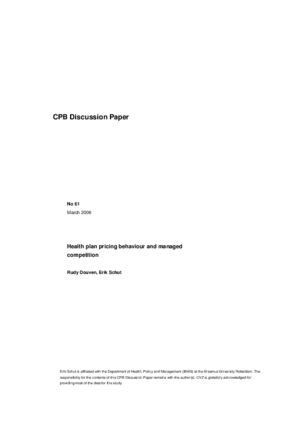Health plan pricing behaviour and managed competition
Felle premieconcurrentie in nieuw zorgstelsel
We are sorry, unfortunately there is no English translation of this page.
Contacts

In the Dutch social health insurance scheme, health plans operate in a managed competition framework. Essential features of this framework are risk adjustment, open enrolment and community rating.The objective is to study how health plans determine their community rated premiums. Using a panel data set for all health plans operating in the Dutch social health insurance market over the period 1996-2004, we estimate a premium model to determine which factors explain the price setting behaviour of health plans.
Our empirical results indicate that competition did not play a major role in premium setting by health plans. We find that financial stability rather than profit maximisation offers the best explanation for health plan pricing behaviour. The forecast of next year's health-care expenditure by the government and the adjusted forecast by the insurers' association play a major role in health plans' pricing decisions. The introduction of a national health insurance scheme in 2006 urged all citizens to reconsider their health plan choice. The threat of losing customers had a profound impact on health plans' pricing behaviour. In sharp contrast to the period 1996-2005, in 2006 competition seems to play a dominant role in insurers' pricing decisions. Whether this will be a temporary or a lasting phenomenon is hard to predict.
Downloads
Authors

